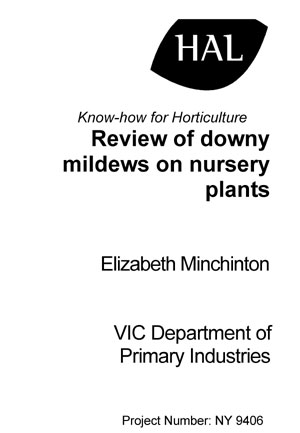|
Downy mildew diseases cause significant problems in nursery seedlings, if not controlled.
- They are prevalent in cool wet months, but can occur all year around.
- The diseases generally don’t kill the plant; they make it look ill, uncared for and therefore unsaleable.
- Downy mildew diseases are found on many nursery seedling lines e.g. stock, brassicas, viola, anemone, onion and lettuce.
- The diseases are estimated to cause economic losses of 10-12% in production of ornamental and vegetable seedlings in nurseries, which are valued at $60 million nationally (32 million punnets).
- Crop loss estimates, made by growers suggest that losses due to downy mildews account for about $4 million in retail sales nationally.
This 28 page detailed publication, is designed to assist nursery managers better control downy mildew.
Author
|
Elizabeth Minchinton
|


Control Strategies for Downy Mildews :
To control downy mildew on seedlings and in nurseries, integrate management strategies with fungicide sprays.
- Hygiene
Keep all areas clean and weed free. Rogue out heavily infected seedlings as these provide a source of spores for subsequent infections.
- Irrigation
Avoid watering seedlings in the mornings, when spores are released and available for infection.
- Ventilation
Space trays of seedlings to improve ventilation. This will dry leaf surfaces off quickly to reduce leaf wetness and thus infection.
- Nutrition
Maintain a balanced program of nutrition as a deficiency of potassium (K) will make seedlings (cauliflowers) more susceptible to the disease.
- Fungicides
Apply fungicide protocols developed by Projects NY406 and NY97011 or
maintain a fungicide spray program consisting of registered fungicides when the
downy mildew disease is expected.
- Monitor
Monitor seedlings on a regular basis to detect downy mildew (at least once a week).
- Quarantine
Isolate stock plants, especially when first introduced into the nursery.
Acknowledgements :
The author thanks the following for their contributions to Downy Mildews on Nursery Plants.
Gray Harrison – Chemical Standards Branch
Ian Pascoe – Manager Crop Health Services
Bob Taylor – Nursery Consultant
Dr Peter Ridland – Research Scientist
|

